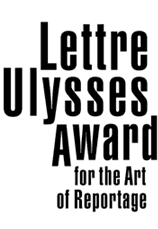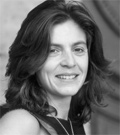
Anne Nivat, France
 “I’ve felt fear which has displaced every other feeling, but also solidarity with dozens of strangers with whom I’ve shared unique moments – moments of joy, because I could feel safe for a minute, or because I was warmed by a cup of hot tea. I tried to talk to as many people as possible: with men, women and children whose lives have been destroyed by this war, with rebels who have nothing left to lose, with Russian soldiers or officers who are caught up in this so-called “anti-terror operation” as in a trap.”
“I’ve felt fear which has displaced every other feeling, but also solidarity with dozens of strangers with whom I’ve shared unique moments – moments of joy, because I could feel safe for a minute, or because I was warmed by a cup of hot tea. I tried to talk to as many people as possible: with men, women and children whose lives have been destroyed by this war, with rebels who have nothing left to lose, with Russian soldiers or officers who are caught up in this so-called “anti-terror operation” as in a trap.”
Journalist and writer. Anne Nivat was born in 1969 and grew up on the Swiss border. She studied at the IEP (L'Institut d'études politiques), the institute of political sciences at the leading university Sciences Po in Paris, and completed her studies with a doctorate.
Nivat published her first book Quand les médias russes ont pris la parole: De la glasnost à la liberté d'expression, 1985-1995 (Communication et civilisation) in 1997 (L’Harmattan). The work is an analysis of the Russian media landscape during the transformation of the Soviet State, which was subject to many radical changes. In 1998, Anne Nivat became a correspondent for the French daily newspaper Libération in Moscow, and has also reported for other international newspapers and media from Russia since then, including Le Soir, Ouest France, Le Nouvel Observateur and the Washington Post.
In September 1999, Nivat travelled to Chechnya. Although the Russian government refused to accredit her, she reported from there undercover – disguised as a Chechnyan peasant – with the help of a satellite phone. Her book Chienne de guerre. Une femme reporter en Tchétchénie (Fayard 2000) describes her experiences of daily life during the war in Chechnya through her encounters with rebels, soldiers and civilians. The book was translated into several languages and won the Prix Albert-Londres in July 2000. Nivat also received the Prix Eléonore Pimentel Fonseca (Naples 2000) for her reporting from Chechnya.
Working together with Louisette Ighilahriz on L’Algérienne (Fayard 2001), she describes the life and memories of the daughter of a freedom fighter, who was born in 1936. The violent history of Franco-Algerian relations in the 20th century is recapitulated through the biography, and the work also focuses on torture by the French army during the Algerian war (1954-1962). The book received a great deal of attention in France, stimulating renewed discussion about the justification of torture.
La maison haute. Des russes d’aujourd’hui (Fayard 2002) is a monograph about a multi-storey building in Moscow which was constructed by political prisoners under Stalin. Initially, the apartments in the building were only rented to party members. Since Perestroika, the building has experienced a fundamental change, and can be seen as a symbol for such changes throughout Russia. The author lives in the building herself, and through her conversations and observations there, she provides a picture of Russian society today.
La guerre qui n'aura pas eu lieu (Fayard 2004) was issued in spring 2004, a collection of further reports from Chechnya. Her most recent book is Lendemains de guerre en Afghanistan et en Irak (Fayard 2004). As in all of Nivat’s books, she draws upon her affinity to the people affected, particularly women, depicts the everyday consequences of geopolitical cataclysm. She herself emphasises that her work is less about analysis than about immersing herself in, and living among, people. Shortly after its appearance in September 2004, this impressive travel reportage won the Prix Erwan Bergot, a journalism prize from the French Ministry of Defence.
Anne Nivat speaks French, Russian and English and is currently working on a book about Central Asia. She lives in Moscow.
